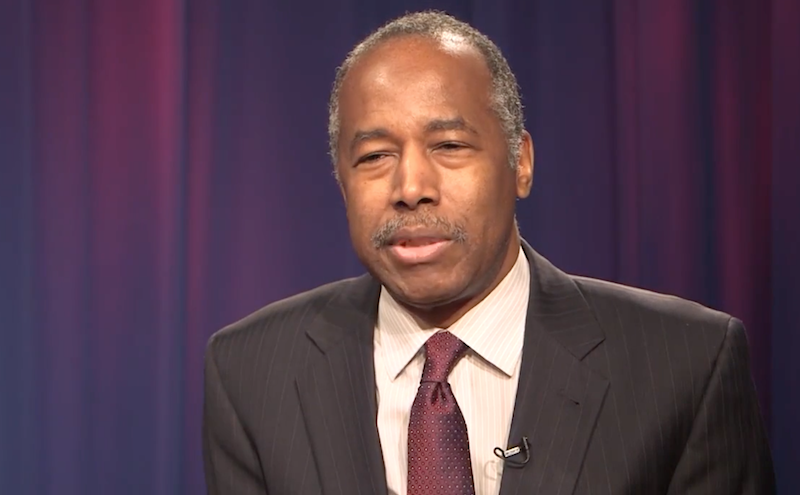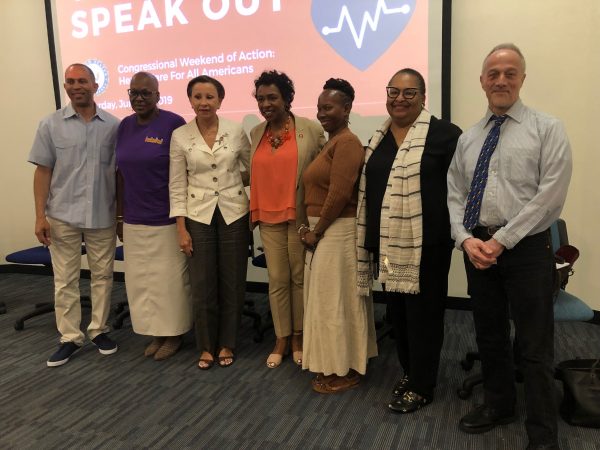U.S. Department of Housing and Urban Development Secretary Ben Carson says policymakers must take “chronic disparities” into account as they formulate a response to the spread of the coronavirus in African American communities.
Carson, a former neurosurgeon and the only black member of President Donald Trump’s Cabinet, in a phone interview with McClatchy on Thursday said that treating health conditions like hypertension and diabetes would have a “superficial impact.”
Individuals with those types of underlying health conditions, which are prevalent in the African American community, are at a higher risk for severe complications from the coronavirus.
A White House council that he leads will be looking at “underlying issues” like overcrowding in living quarters, “not having healthy food within an easy commute,” and “not having good medical follow-up care,” Carson told the media outlet.
“Those are the kinds of things that really lead to the situation, where you have a disparity when you get hit by something like the coronavirus,” he said. “So it doesn’t mean that we don’t want to deal with the acute issues, as well, but we don’t want to stop there. We really want to get to the basis of it.”
“And we want to use the right kind of data, also, to help us to target the right people,” he added.
Trump in April tasked the White House Opportunity and Revitalization Council — led by Carson — with addressing inequities in the African American community after the number of coronavirus cases climbed in that demographic group.
A Centers for Disease Control and Prevention study of 14 states conducted in March found that African Americans were almost twice as likely to be hospitalized than other individuals who were confirmed to have the disease. The study found that 33 percent of hospitalized coronavirus patients were black.
Carson and other black leaders the president has asked to look into the issue, including Republican South Carolina Sen. Tim Scott, are preparing recommendations to present at the White House
A senior HUD official said members of the council will meet at the White House on Friday to discuss their proposals, then they will make a presentation to the president in the near future.
In the interview with McClatchy, the HUD secretary said that the council is looking at the areas that have the highest rate of COVID-19 infections, hospitalizations and hospital care that is not compensated as a guide to determine which communities are underserved.
“This is not going to be a fly by night type of thing. This is really going to be an in-depth analysis and treatment. It’s going to require some legislative changes,” Carson said.
Carson said he did not want to get ahead of any presidential announcements but indicated he would recommend the easing of legislative restrictions on federal funding to cities and states, so that local governments have the flexibility to spend the money on programs they believe will benefit their individual communities the most.
Since Trump announced in April that he had directed Carson and the White House council to expand their work beyond economic incentives for businesses that invest in distressed communities, the HUD secretary has been holding listening sessions with black leaders “on both the left side and on the right side” of the political spectrum.
“We’re hearing from them that they are having great difficulty and traditionally have had great difficulty, even with well-designed programs, because the control is too far away from the local setting and everything gets diluted and takes too long,” Carson said.
As part of its work, the council will look at what programs have been effective in the past, which Carson said tend to be organized by nonprofit and non-governmental organizations.
“Instead of having a big, federal, big brother, we really want to empower the local NGOs to be able to carry out things,” he said. “Obviously, we’ll have to supervise and oversee to make sure that taxpayer dollars are spent appropriately, but making sure that you really get it to a level where you’re going to have an immediate impact.”
Editor’s Note: This story was reposted in whole from the McClatchey DC Bureau. McClatchy is a respected media company operating 29 daily newspapers in fourteen states.









